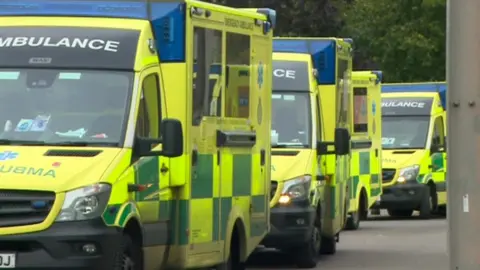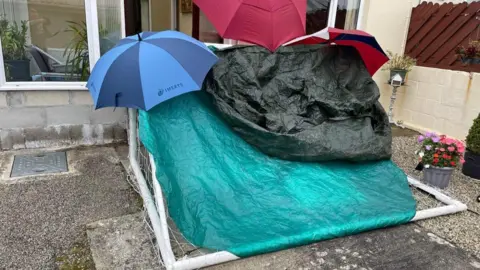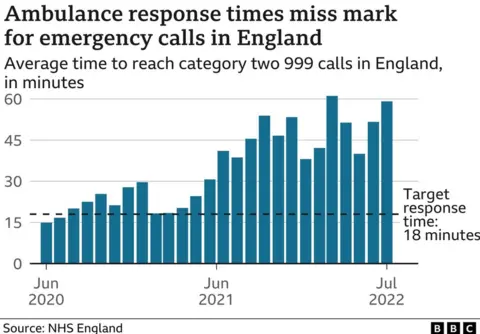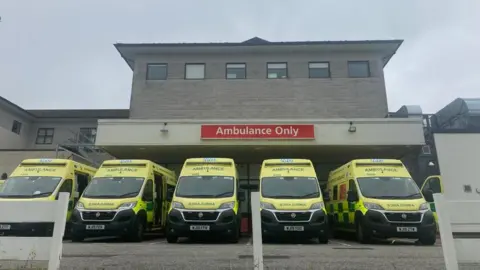Cornwall mother, 90, in 40-hour wait for ambulance
 BBC
BBCA 90-year-old woman waited 40 hours for an ambulance after a serious fall.
Stephen Syms said his mother, from Cornwall, fell on Sunday evening and an ambulance arrived on Tuesday afternoon.
She was then in the vehicle for 20 hours at the Royal Cornwall Hospital. It comes as an ambulance trust warns lives are at risk because of delays in patient handovers.
It was also reported a man, 87, who fell, was left under a makeshift shelter waiting for an ambulance.

South Western Ambulance Service NHS Foundation Trust said it was "sorry" for its response to both incidents.
Mr Syms, from St Stephen, told BBC Radio Cornwall: "We are literally heartbroken to see a 90-year-old woman in such distress, waiting and not knowing if she had broken anything.
"The system is totally broken."
He said it took nine minutes before his 999 call was answered.
"If that was a cardiac arrest, nine minutes is much too long, it's the end of somebody's life," he said.
Mr Syms said paramedics were "absolutely incredible people".
He added: "The system is not deteriorating, it's totally broken and needs to be urgently reviewed."


The average time it took an ambulance to reach a 999 call for something like a heart attack or stroke was nearly one hour in July in England.
That's more than three times longer than the 18-minute target.
The problem has been getting steadily worse over the past year, but the delays aren't confined to ambulance waits.
Many people across the UK have also spent hours waiting outside emergency departments after arriving in ambulances, because there is no room for them to be treated in the hospital itself.
That's linked to patients staying in hospital much longer than usual after they've recovered because of issues providing the social care they need at home.
Delays at every stage are causing harm to patients, experts say.
The NHS is under intense pressure but health chiefs say plans are in place to create thousands of extra beds and recruit more 999 call handlers ahead of this winter.
The government says it has invested millions into ambulance services and is setting up a taskforce to look at ways of making sure patients are only in hospital for as long as they need to be.


A spokesperson for the South Western Ambulance Service NHS Foundation Trust said: "We are sorry and upset that we were unable to provide Ms Syms with the timely response and care that she needed.
"Our ambulance clinicians strive every day to give their best to patients.
"Health and social care services are under enormous pressure.
"We are working with our partners in the NHS and social care in Cornwall, to do all we can to improve the service that patients receive."

Conservative MP for Truro and Falmouth Cherilyn Mackrory said she had written to the health secretary to urge him to visit and address the issue.
She said NHS managers, the local authority and government needed to work together to fix it.
She also said a lack of ongoing home care was the "crux" of the problem.
Speaking on BBC Radio Cornwall, Ms Mackrory said: "We don't have proper staffing of domiciliary care or safe places for people to be discharged to.
"Now, it's much more complex than that, but that is the crux of it, and we need to make sure that we do this so that we can safely discharge patients out of the hospital."
'Shift the blame'
Former Liberal Democrat MP for St Ives and current Cornwall councillor Andrew George disagreed with Ms Mackrory.
He said he thought it was wrong for MPs to be "attempting to shift the blame to local managers and providers of service".
"This is a policy failure which starts at the top," Mr George said.
A Department of Health and Social Care spokesperson said: "We absolutely recognise the pressures ambulance services are facing - with call handlers answering nearly one million calls nationwide in July alone - and we are taking action to support them.
"This includes the NHS investing £150m to help ambulance services meet pressures and £20m this year to upgrade the ambulance fleet, while we have also grown the ambulance and support staff workforce by almost 40% since April 2010.
"We continue to work closely with the NHS to improve care for patients, tackle delayed discharge and speed up handovers to get ambulances back on the road."

Follow BBC News South West on Twitter, Facebook and Instagram. Send your story ideas to [email protected].
